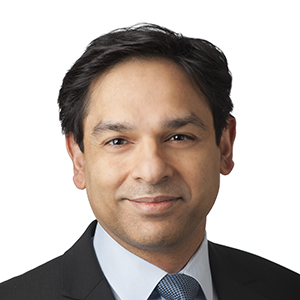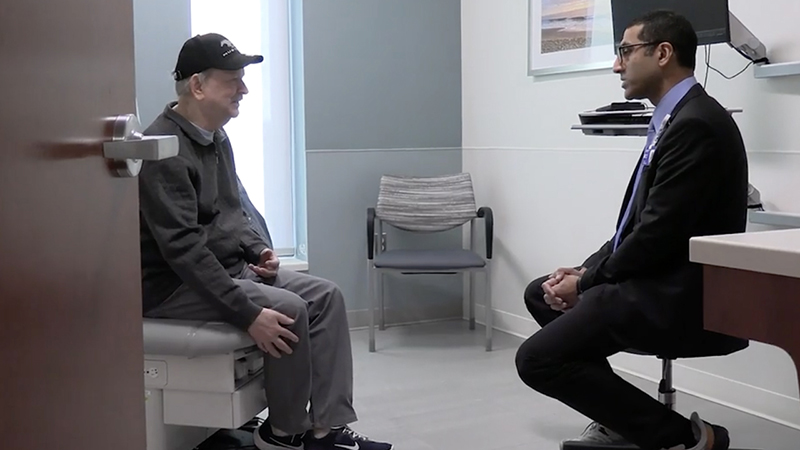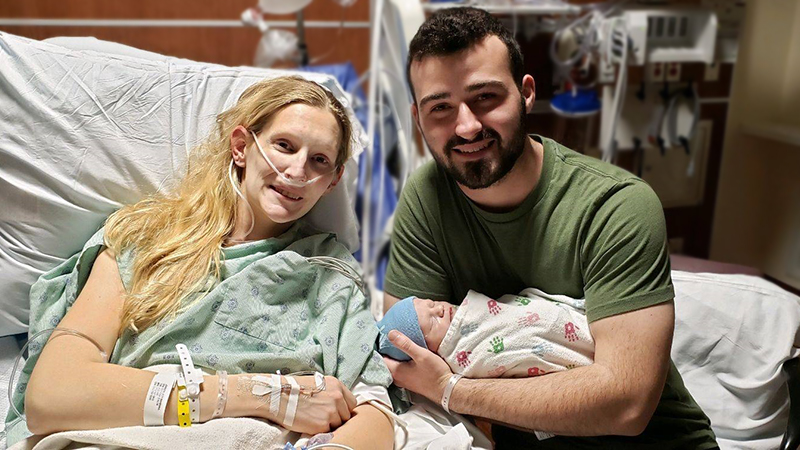The Second Chance Couple
Published January 2020
Husband and Wife Defeat Cancer and Rare Heart Defect
Like most passionate fans, Brett and Christine Bowman, both 46, remember where they were when the Chicago Cubs were on their postseason run on the way to win the World Series in 2016. But, unlike most fans, Brett and Christine didn’t spend much time watching the games from home. They were mostly at the hospital, where Christine was recovering from surgery, having been given a second chance at life.
In 2017, almost a year after the Chicago Cubs won the World Series, Brett got his own second chance. Upon returning from a business trip in Tokyo, Brett had a sore throat that kept getting worse. He went to an immediate care center and was referred to Northwestern Medicine Otolaryngologist Landon J. Duyka, MD, who found a large tonsil mass. A biopsy was soon performed under anesthesia.
“When I woke up in recovery, my wife had tears in her eyes. I knew something was definitely wrong,” says Brett. “After the biopsy, I was diagnosed with throat cancer.”
Throat cancer arises in the pharynx, or the swallowing passage, and the voice box, or the larynx. There are two main types of throat cancer: human papillomavirus (HPV)-associated and non-HPV associated, which is typically caused by smoking. Brett’s cancer was HPV-associated.
Brett felt lost. He had a busy career in commercial real estate, three beautiful kids and a wonderful wife. Cancer wasn’t an option for him.
“I felt unsure of the next steps and needed someone to guide me through these dark days. That’s when I met Dr. Samant,” says Brett. Sandeep Samant, MD, is a Northwestern Medicine head and neck surgeon and a member of the Robert H. Lurie Comprehensive Cancer Center of Northwestern University. “Dr. Samant and his team are unbelievable. They provided me with a very specific roadmap and helped me take full control through this unchartered territory.”
A Second Second Chance
“When faced with a new cancer diagnosis, patients often feel helpless and paralyzed by the burden of new information they must process and decisions they need to make,” says Dr. Samant. “For Brett, a team of caregivers from multiple specialties at Lurie Cancer Center set up a comprehensive care plan tailored to his needs. Each member of the team played an important role and acted as an advocate for Brett throughout the course of treatment.”
After undergoing two robotic surgeries to remove his tonsil cancer, Brett received 35 bouts of post-operative chemotherapy, along with radiation. But after 18 months of clear scans, the cancer reappeared ― in one of his lungs. Instead of feeling defeated, Brett was invigorated. He and his wife took this second diagnosis as an opportunity to finally launch a business based on their shared passion for providing food, cocktails and conversation in small, intimate settings. They founded a small-batch artisan roasted nut company.
Northwestern Medicine Thoracic Surgeon and Lurie Cancer Center Specialist Samuel S. Kim, MD, performed a state-of-the-art, minimally invasive robotic surgery to remove the tumor from Brett’s lung. Because of this technology, the very next day, Brett was discharged from the hospital and able to keep previously scheduled appointments with prospective retailers for his product across Chicago. Christine was by his side.
“Growing our client list for our company was my motivation to get past surgery. It inspired me to push myself and not dwell on my situation,” says Brett. “This is something my wife and I created together, and I wanted to do my part.”
Now, Brett is cancer-free, and the Bowmans’ gourmet nuts are in 15 stores in the Chicagoland area, with more on the horizon. “This wouldn’t have happened if not for Northwestern Medicine,” Brett says. “It was the second time Northwestern Medicine changed — and saved — our lives.”
The First Second Chance
Exactly one year before Brett’s cancer diagnosis, when the Chicago Cubs won the World Series, his wife Christine moved her care to Northwestern Medicine. Christine had a heart murmur her whole life, but Northwestern Medicine Internal Medicine Physician Kathryn M. Petrungaro, MD, recognized that even though Christine had run a marathon and had three successful pregnancies, she needed to see a cardiologist.
“Dr. Petrungaro was the first step of the life-saving care I received at Northwestern Medicine,” says Christine.
Northwestern Medicine Cardiologist Micah J. Eimer, MD, recognized that the murmur Christine had been told to live with could potentially take her life. They went to another health system for a second opinion, but then found Northwestern Medicine Cardiac Surgeon S. Christopher Malaisrie, MD. “When we met Dr. Malaisrie, we didn’t think twice about it. We trusted him so much. He is tremendous,” adds Brett.
Christine went into surgery for an aortic valve replacement and an aneurism repair. But during surgery, the care team made an astonishing discovery: Christine had a rare birth defect. Normally, the aortic valve has three flaps that open and close to allow blood to pass through. Christine had only one, an exceedingly rare unicuspid aortic valve.
“Christine’s case was extremely rare,” says Dr. Malaisrie. “The incidence of a unicuspid aortic valve has been estimated to be only 0.02 percent of the adult population in the U.S.”
Christine woke up from surgery just as the Cubs took the lead in a critical game toward their World Series run. “It was fate in a major way,” says Brett. “My wife started her comeback within minutes of the Cubs starting their ninth-inning rally in San Francisco to win the game and the National League Division Series.”
Today, Christine feels better than ever. Prior to the surgery, physical activity was challenging, and she always felt tired. Now, she works out four to five times per week.
“The doctors and nurses at Northwestern Medicine saved our lives,” says Brett. “And now we’re living them to the fullest. We both got a second chance and are trying to make the most of it.”







